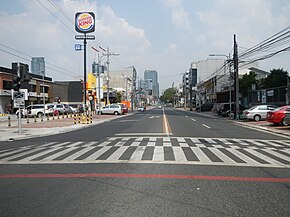National Route 172 (Philippines)
| Timog Avenue | ||||
|---|---|---|---|---|
| South Avenue | ||||

Timog Avenue, looking east from the junction with Mother Ignacia Avenue
|
||||
| Route information | ||||
| Maintained by Department of Public Works and Highways | ||||
| Length: | 2 km (1 mi) | |||
| Major junctions | ||||
| East end: |
|
|||
|
Tomas Morato Avenue Mother Ignacia Avenue |
||||
| West end: |
|
|||
| Highway system | ||||
|
Roads in the Philippines
|
||||
Roads in the Philippines
Timog Avenue is a street located in Quezon City within the Diliman area of northeastern Metro Manila, Philippines. It runs east–west through the southern edge of the barangay of South Triangle and used to be named in English South Avenue. The street is located in Quezon City's entertainment area, known for its restaurants, bars and karaoke and comedy clubs. It is also home to the GMA Network Center studios located on the avenue's junction with Epifanio de los Santos Avenue (EDSA). The street is designated as a national road, numbered N172.
The avenue forms the southern boundary of the formerly proposed 400-hectare (990-acre) Diliman Quadrangle within the former Diliman Estate also known as Hacienda de Tuason, purchased by the Philippine Commonwealth government in 1939 as the new capital to replace Manila. It was originally planned as the new city's Central Park housing the new national government buildings (the new Presidential palace, Capitol Building, and Supreme Court complex) within the 25-hectare (62-acre) elliptical site now known as the Quezon Memorial Circle. The quadrangle is bordered on the north by North Avenue, on the east by East Avenue, on the south by Timog (South) Avenue, and on the west by West Avenue. Designed by American city planner William E. Parsons and Harry Frost, in collaboration with engineer AD Williams and architects Juan Arellano and Louis Croft, the site was also to contain the 15-hectare (37-acre) national exposition grounds opposite the corner of North Avenue and EDSA (now occupied by SM City North Edsa shopping mall). The Diliman Quadrangle had been largely undeveloped for decades due to lack of funding. After several revisions, the government planners moved the city center to Novaliches due to its higher elevation. On April 24, 1964, the Quezon City council renamed streets in the area commemorated at the 11th World Scout Jamboree the previous year, it was to be renamed Boy Scouts Avenue, but the government disagreed, however the street eventually renamed Timog Avenue (Tagalog for South). By 1976, the country's capital had been transferred back to Manila with only the Quezon Memorial built in the former capital site.
...
Wikipedia

